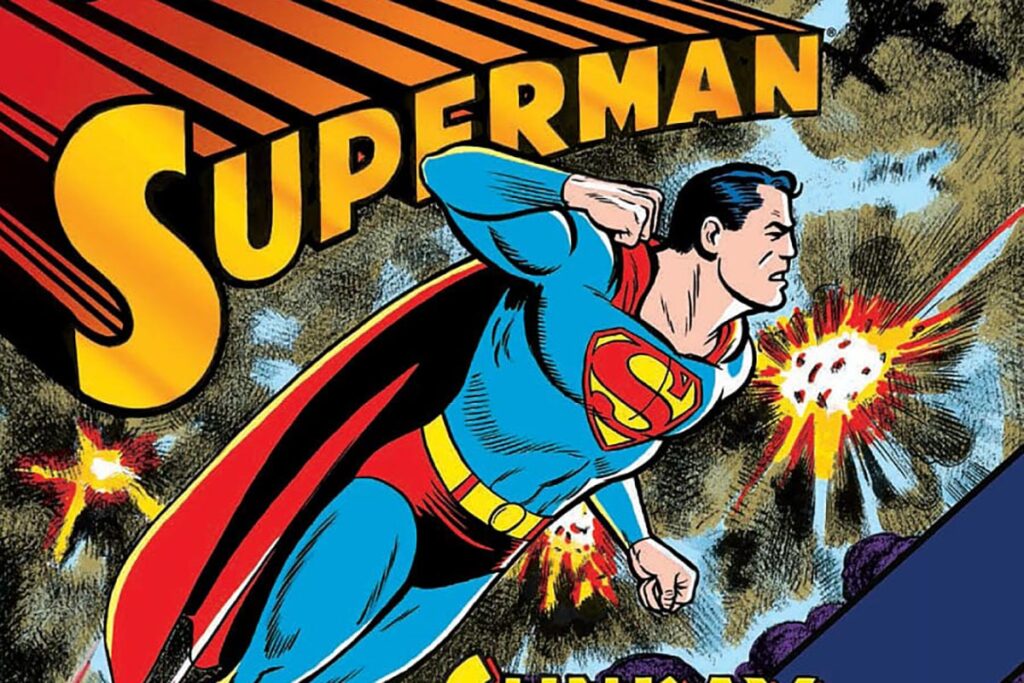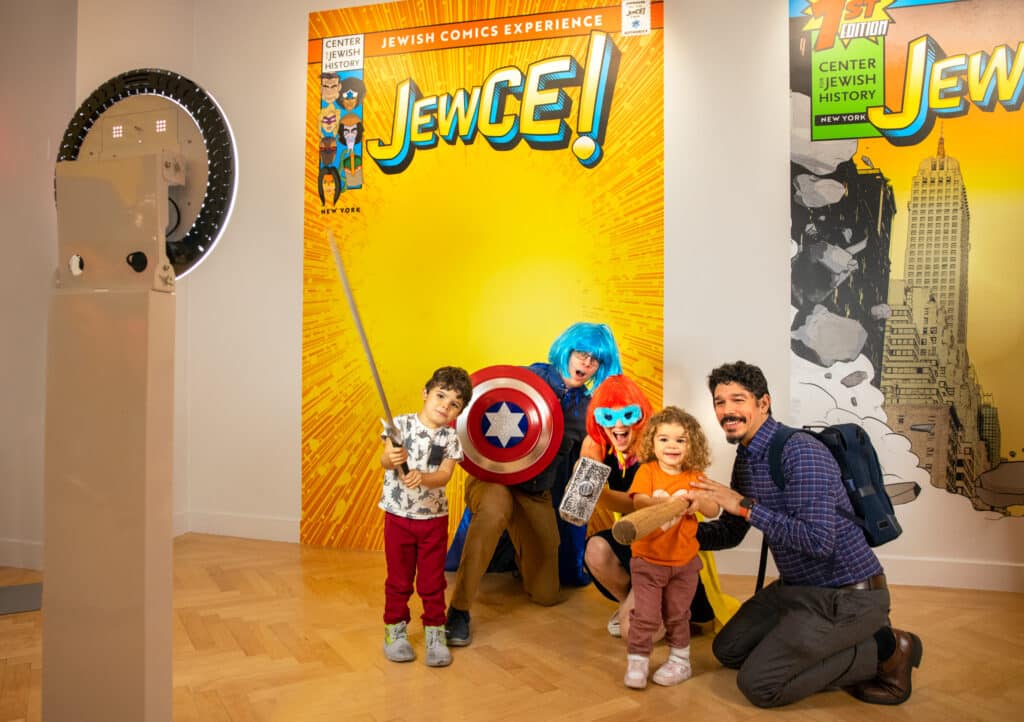
Comic books are an inherently Jewish invention. Superman? Jewish. Captain America? Modeled after a Jew. The Thing? Yep, him too. Batman? Created by Jews. Spider-Man? His Jewishness is debatable, but still widely considered a member of the tribe.
The contributions of Jewish creators aren’t just a footnote in comic history — they’re the foundation on which much of the genre stands today. The vast majority of the superhero industry was crafted by Jewish artists and writers, often in their image. However, the cultural phenomenon that is comic books and the media spawned from them has been often stripped of their Jewish origins. A group of Jewish pop culture historians and comic book creators have made it their mission to highlight this legacy and the contemporary contributions of Jews to the industry.
JewCE is the Jewish comic con that documents history
One year ago, hundreds of comic book fans gathered at the Center for Jewish History in New York City for the first Jewish Comics Experience (JewCE). Now, the creatives behind the widely successful Jewish comic con have released a documentary ahead of ahead of the second annual JewCE on Nov. 10.
The documentary, which will air on Jewish Life Television, details the history of Jews in the comics industry and why it was important to highlight those contributions in an exhibit and a convention.
“Superheroes are a Jewish invention, and it’s this amazing chapter of American history that’s been overlooked,” Roy Schwartz, documentary co-producer and JewCE awards Chair, told Unpacked. “Comic books are as Jewish American as jazz is African American.”

“These stories, they’re not these dry, factual, boring stories of yesteryear. These are as exciting and as crazy a story as you can find in any comic book. And it’s very much a story worth telling,” he continued.
These stories will continue to be told, as the JewCE exhibit has begun touring the United States. as the JewCE exhibit has begun traveling across the United States. It will open at the Capital Jewish Museum in Washington D.C. on Nov. 1.
How Jews built the comic book industry
In the early 1900s, Jews in the U.S. faced significant discrimination in the mainstream publishing, advertising, and fine arts fields. Many Jews were not allowed to enter these industries and instead joined the newly-formed comic book industry, which was considered a low-tier form of entertainment.
“There’s a long standing bias favoring elite culture, the symphonies of classical music and opera and fine art compared to the more commercial, lowbrow forms of culture that were products of the 20th century,” Dr. Gavriel Rosenfeld, president of the Center for Jewish History, told Unpacked.
“It’s taken a while before Jews and others have come to appreciate how high art and low art blend in comic books like they blend in any number of other forms of cultural expression,” he added.
Read more: How Jewish creators shaped the comic book industry
Many Jewish creators imbued their Jewish ethics, stories, and identities into their characters. Many Jewish creators brought their own experiences of persecution and marginalization to their work. Themes of justice, exile, identity, and fighting oppression — central to Jewish history — naturally found their way into the superhero genre.
The documentary speaks about the superhero’s everyday persona as a metaphor for American Jews having to mask their Judaism. The superhero is who they are, but they need to craft a separate identity to portray themselves in the public sphere.

Jewish comics creators Joe Shuster and Jerry Siegel invented Superman as a Moses figure who was representative of the Jewish immigrant experience of the day. Superman must assimilate into Clark Kent in the outside world, hiding his Kryptonian identity like the European Jews forced to Americanize in the diaspora. His cape, crafted from the baby blanket sent with him from his home planet, can be seen as symbolic of a tallis, his cultural garb.
“The idea that we can change not just who we are, but what we are at any given moment is the ultimate assimilation fantasy, which is what Superman represents,” Schwartz said.
Read more: Is Superman Jewish? Here’s why it matters
The Jewish experience of assimilation neatly is reflected by the everyday citizen-to-superhero transformation. While many Jews are perceived as white and identify as such, far-right extremists often view Jewish identity as inherently non-white.
Due to the racism and antisemitism of those groups being labeled as “not white” puts a target on Jews’ heads, forcing them to hide their Jewishness because they have the capability to pass in many scenarios. These moments are Superman being Clark Kent or Spider-Man claiming he’s just Peter Parker.
Read more: Is Spider-Man Jewish? The answer for him and creator Stan Lee is complicated
The documentary and exhibit break down the Jewish origins of the comic book industry, as well as showing how many fan-favorite characters were either inspired by Jews (Captain America was a stand-in for Jewish creator Jack Kirby) or modeled after them (Green Lantern was created in the likeness of Jewish actor Paul Newman).
Comic books as a way to fight antisemitism
Like all superheroes use their powers to stand up to good, the comics industry has helped fight antisemitism in many ways. Many had overtly Jewish characters, Jewish storylines, and heroes fighting against antisemites and Nazis.
Read more: What do Gen Z Jews think about Marvel changing superhero Sabra’s Israeli backstory?
Rosenfeld said for generations, Jewish people have practiced ‘contributionism,’ the belief that by contributing to fields like the arts and sciences, Jewish people would be accepted into society. He hopes that those who see the exhibit, which was curated by CJH Director of Academics Dr. Miriam Mora, will understand that they’ve taken this Jewish history for granted when they watch multiple new superhero movies a year.
“There’s a history there that we might just take for granted as ubiquitous, omnipresent features of our culture,” he said. “I certainly think it’s good for people to know that the Jews are people that make the world they live in a better place whenever possible. And that certainly cuts against the idea of antisemites, that Jews are just a malevolent force that takes away from and detracts from society at large.”

For non-Jews, Rosenfeld specified that acknowledging the Jewish history of comic books might teach them about topics like a diaspora or assimilation that may not be part of their cultures. He believes that teaching through this medium can further open the door to more interest in Jewish history.
Schwartz added that the universality of superheroes may make the Jewish connection more important to people. They may not think about advances in medicine or physics, but people of all backgrounds flock to the movie theaters to see the latest Marvel movie.
“We hope that [JewCE] inspires both creators and readers, both Jewish and non-Jewish alike, to have an interest in Jewish stories and Jewish portrayals, whether it’s through allegory or whether it’s more authentically or more positive representation. Hopefully, it can get all of us as a community to stand just a little bit taller,” Schwartz said.
Originally Published Oct 22, 2024 02:35PM EDT
